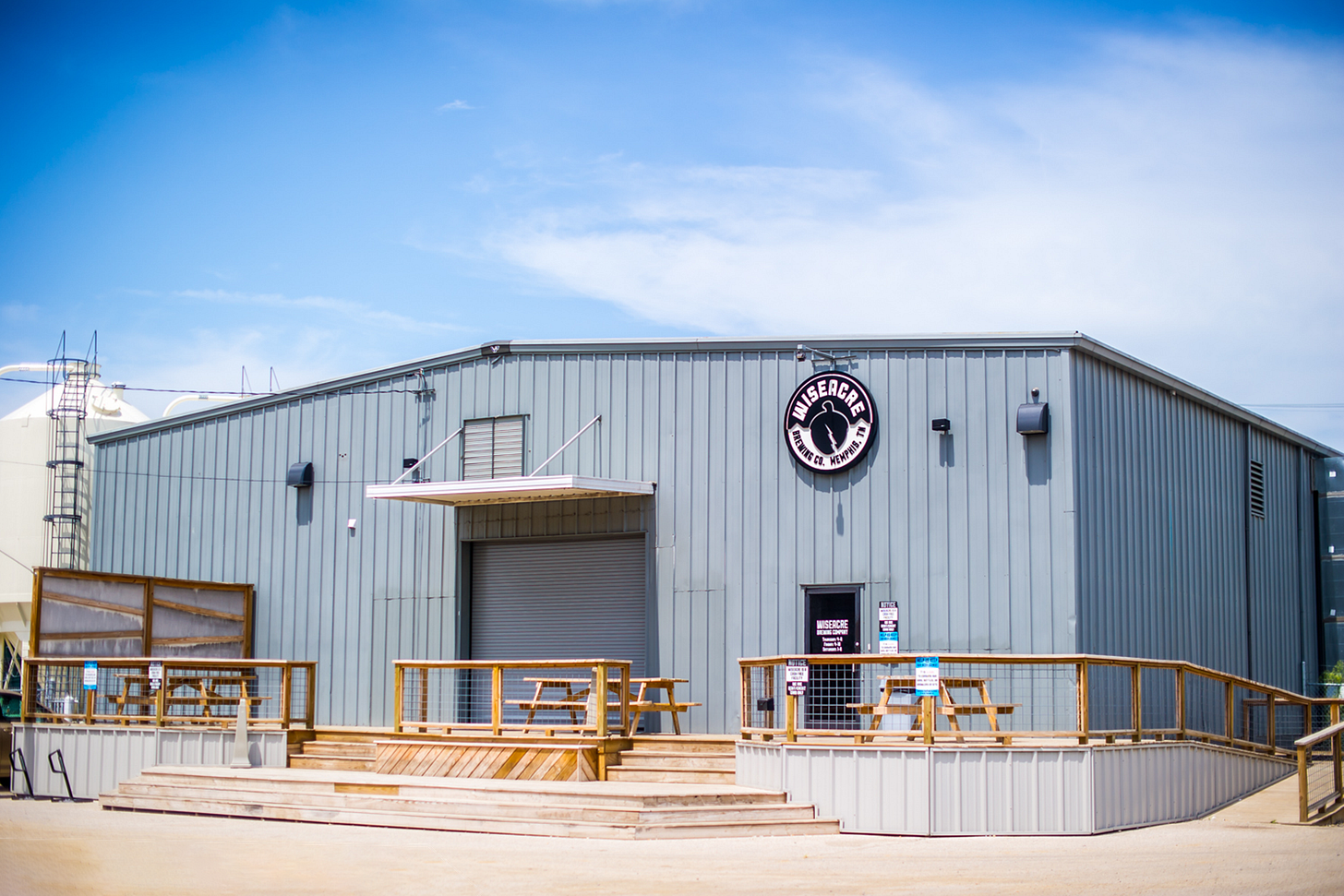Taking the Work But Not Themselves Too Seriously: Interview with Brothers and Wiseacre Brewing Company Cofounders, Kellan and Davin Bartosch
This week’s interview is with brothers, Davin and Kellan Bartosch, the cofounders of Memphis based Wiseacre Brewing Company. The brothers’ passion for beer started at an early age when they infamously stole their father’s rental car during a family trip to Boston and talked their way into the Sam Adams Brewery as high school students. However, it wasn’t until after college, when Davin’s interest in homebrewing started to grow, that the brothers began to talk more seriously about the dream of opening their own brewery. They both felt strongly that they needed to cultivate expertise and years of experience before taking the plunge on their own. Davin went to brewing school, did multiple apprenticeships, and spent several years as the head brewer at Rock Bottom in Chicago, while Kellan spent many years working on the sales and distribution side of the industry. In 2013, Kellan finally convinced Davin that it was time to start their own thing and the brothers opened the doors to their first location.
Over the past 12 years, they have expanded to a second location, opened a pizza kitchen, grown their distribution to more than 20 states, and brought home multiple prestigious awards for their innovative beers, including a Great American Beer Festival bronze medal for Wiseacre’s original beer, Tiny Bomb. The victories have continued, with their Sky Dog Lager being named the best light beer in America in 2025, and their Oktoberfest Lager winning the bronze medal in the Marzen category at the World Beer Cup earlier this summer — wins which have solidified Wiseacre’s ability to create world class lagers.
Over the course of the conversation, we spoke about:
What finally convinced them to turn the dream into reality after years spent gaining experience
The importance of humor in navigating the ups and downs of business and manufacturing
The role of fear in building a business and the reality that there is no “autopilot” phase on the entrepreneurial journey
Learning to let go of control and develop their team
The myth of following your gut and how they think about following trends
The different perspectives they have on creating an identity outside of the business and being the “beer guys”
What’s next for Wiseacre
Note: The following interview has been lightly edited for clarity and length. While every effort has been made to preserve the integrity of the conversation, please be aware that the quotes may not be verbatim but reflect the essence of the dialogue.
How would you describe what you do for work, and the roles that you play at Wiseacre?
Davin: Oh man, I think it's kind of all over the place. This morning we were literally packaging booze. More broadly, I think the older the business has gotten, the more time we spend on helping people figure out the problems with their own jobs. I think my best use in the brewery is to be a problem solver and a critical thinker, and to apply what I know about beer to the processes here so that we can make delicious beer.
Kellan: I think I have a pretty similar answer. However, instead of focusing on production, I have more of a focus on the sales and business development side of things.
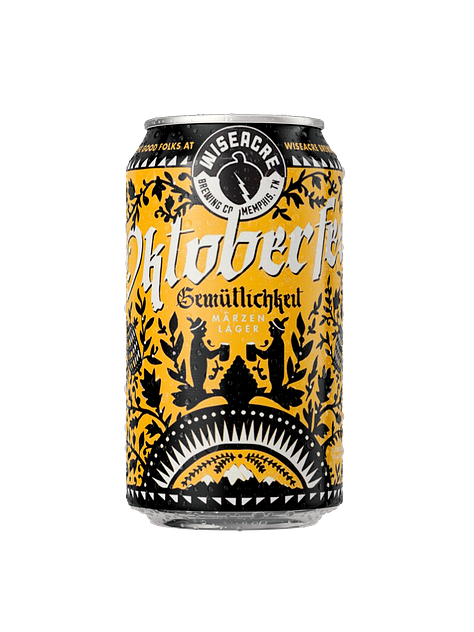
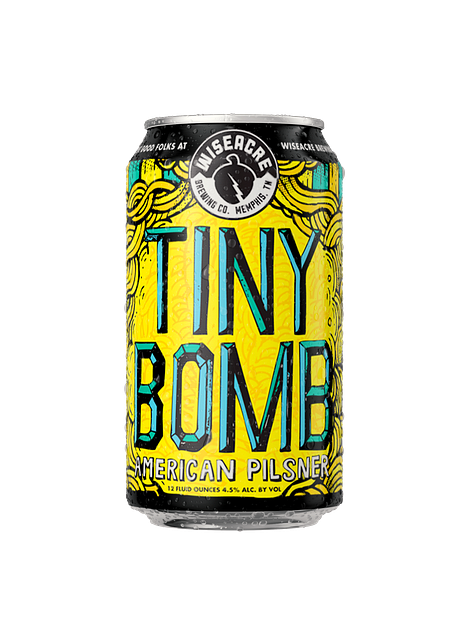
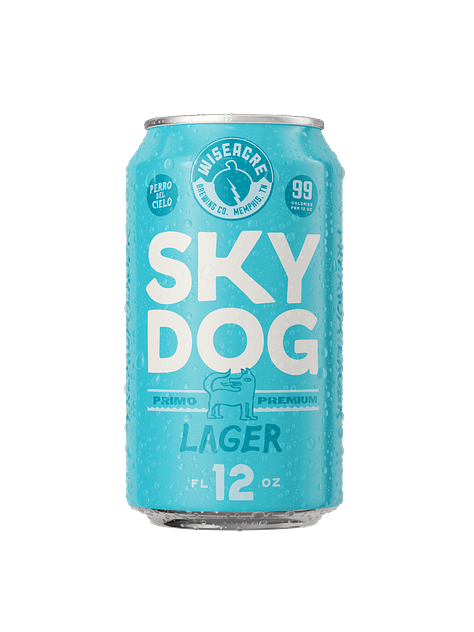
As you mentioned, Wiseacre was a dream that was more than 10 years in the making. During your post college years, Kellan spent time working for an established craft brewery out west and gained experience working for a beer distributor. Meanwhile, Davin went to brewing school, sought out opportunities to be mentored, and gained experience as a brewmaster at Rock Bottom. Still, even with your intention and those experiences, it still could have been easy to let go of a dream and get stopped by fears like, “it’s not the right time,” or “It’s too risky,” etc. What do you think helped you two make the decision to go for it and turn the dream into reality?
Kellan: Davin was the one who had been home brewing forever. That’s very different from brewing professionally, and he wanted to go to school and get more experience. I was the one constantly saying, “Let's go!” for years and years while Davin kept pushing for more and more experience. I remember a point in time where I was selling beer in Nashville in this store in a bad neighborhood, and this guy had a pit bull named Carlito that was running around the store while these guys playing dominos got in a shouting match. The owner ended up pulling out a gun to break up the fight…I remember going outside, calling Davin and being like, “We’re going to do the brewery, right?” It would still be two and a half more years from that point before we started the business.
Davin: I'm really skeptical. When we started talking about the idea, opening a brewery seemed like this ridiculous idea. Back in 2004, there were hundreds of breweries, and now there are close to 10,000. The funny thing is that there are more NBA referees than there were professional brewers in the United States. I felt like I wanted to be really good at brewing before we started the business. I think it’s easy to get caught up in the passion of anything that you eat, drink, or listen to, and people forget how much time, training, and experience it takes to become really great at something. The skeptic in me always wanted to feel like we had a really solid foundation of experience and not just the love for what we were doing.
Davin - the answer might be that Kellan pushed you, but what do you think got you over the hump in the end to actually start the business?
Davin: I think I really got to a point where I felt like I wasn't learning anymore. I’d been an assistant brewer and then the head brewer at the third busiest brew pub in the country for three years. I’d won a bunch of medals for beers that I'd made, and I think I finally got to a point where I didn’t think I was going to learn anything that would make me better or more prepared for what we were about to do. I had just gotten really good at the occupation part of opening a business.
Kellan: That's only half the answer, though. For the record, I moved back to Memphis, where we wanted to open the brewery, found a partner, and had all the paperwork ready to go. I drove up to Chicago to meet with Davin and his wife and convince them that it was time to go.
Humor is something that comes out in your interviews and seems playfully integrated into Wiseacre’s website and marketing. In your interview on the “Driven By” podcast you two spoke about how one of the first things you’ll do on a tough day is drink a beer. I personally loved this quote from Davin:
“A sense of humor is of the utmost importance. There are more days when things go wrong than when things go perfectly. That’s the world of manufacturing and brewing professionally. Success has a lot more to do with how you react to the problems than whether or not you have the problems. Everyone has problems…The most important thing you can do is have a plan when things happen. From an attitude perspective, you cannot get crushed by the fact that things keep going wrong. You have to get back on the horse and hopefully you can laugh about how the horse has stupid legs.”
Can you talk more about how humor has helped you deal with the tough moments as entrepreneurs?
Davin: Humor is really important. I think our job is to take beer really seriously, but not really take ourselves seriously. We want to win medals, and we want to make the best beer on the earth, but I think there's a lot of danger in taking all of this too seriously. I think we're on earth for the experience and the fun, and I think if you get rid of those things, it makes for a pretty lame existence. It has always been super important for people to be able to laugh and joke about stuff around here, and we make a lot of room for that. I think sometimes it gets a little too much for Kellan, but he's usually right there with me.
Kellan: I would also add that I think having a positive attitude is a must in life in general if you want to be successful at anything, whether it's a friendship, your job, or whatever. Things will happen that you can't control. Laughter is our way of having a good attitude about those things. It helps us cope because it brings home the point that none of this is the end of the world. The horse has funny legs, but you do have to get back on the horse and keep going. That’s hard to do without a good attitude. Laughter is our way of doing that.
When people think about entrepreneurship, most people’s first fear is: What if I never make money? On the flipside, there can be lots of fears that arise when things go well and you choose to invest money in growing the business. Wiseacre has expanded a lot over the years - you’ve grown to two locations, expanded your distribution to more than 20 states, created lots of new flavors, and added a pizza kitchen with Little Bettie. How has your relationship to fear changed, if at all, as the business has grown?
Davin: I think the opening of the first brewery was so terrifying and stressful that everything that's happened afterwards really just doesn't seem anywhere near as big of a deal to me. The first three months were pure insanity, and I was freaked out everyday. I slept 4 hours a night and was constantly sweating, both from the physical exertion and just from nervousness.
Kellan: I might be different than Davin on this one. I remember being sweaty and busy, but I felt pretty good about things. Since then, we have chosen to continue to put risk on top of risk and bet on ourselves over and over again. But I don't know that the fear really ends. I think of Fred Smith, the founder of Fedex, who is a Memphis guy and passed away earlier this year. He was still the chairman of the board of Fedex at 82 and had stepped down from being the CEO right before that. I’ve wondered if it ever really ended for him. Even with all the success, he was still trying to figure out how to make Fedex run and battling market challenges, new technology, and the threat of Amazon. It’s just another example of the reality that you don’t ever hit this cruise control point as an entrepreneur. In our case, we're in the middle of losing two people right now that are in key positions. We’re having to figure out how to fill those spots while we’re figuring out everything else at the same time.
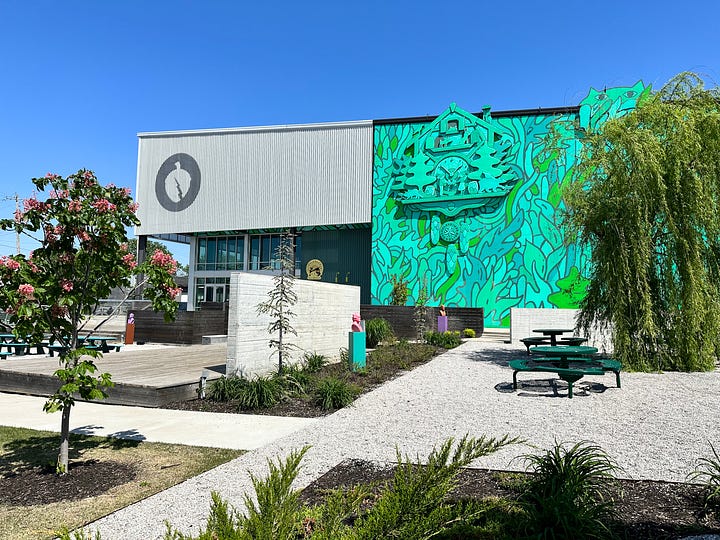
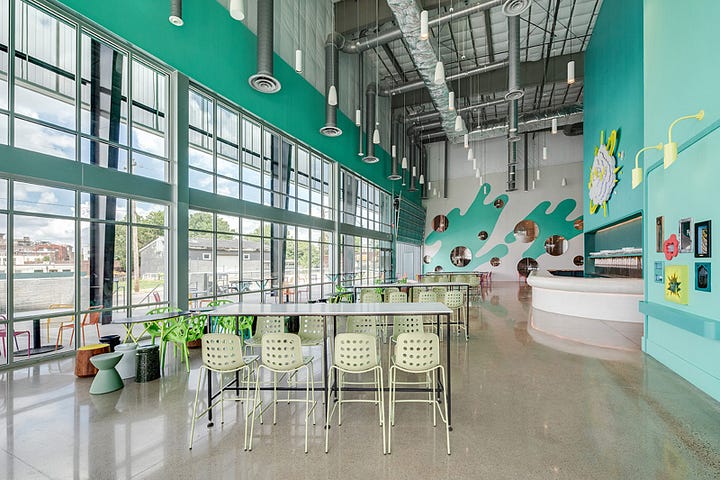
You’ve touched on the challenge of learning to manage people and evolve as leaders. What are some of the biggest evolutions each of you have made in learning to let go of control and develop your team?
Kellan: I think a lot of it is about trying to guide people more than tell them what to do because oftentimes you hire people who can do a job a lot better than you can. I think learning to give them freedom has been super important, as well as giving them a vision of where we’re going so that they have a vision of how they can keep developing within that.
Davin: When we first started, we were doing it all. Everything from bull shit accounting to bartending and social media. I was fixing electrical issues I had no business fixing, as well as doing the brewing and everything else we needed to do to keep the brewery going. At this point there's only one aspect of brewing that I'm better at than everybody that's here, and we don't even do that type of brewing at Wiseacre. I think it's on me to help the team make good decisions, but ultimately I trust them. I trust them more than I would myself.
Was that a challenging transition for you, Davin? Given your background, I have to imagine that letting go of some control over the brewing process had to be difficult at first.
Davin: It was really difficult for me. I'm not really like this anymore, but I used to be the type to scream at people and fly off the handle. If you talk to some of our early employees, they will tell you about some of my freakouts. You can train people, but inevitably they are going to decide to change things at some point which can create problems. There's a never ending joke in the brewery about how many times I've seen whatever particular type of screw up is happening that day. I always say zero because there's an infinite number of variables to screw up in making a batch of beer. You rarely see the same one twice.
What eventually helped you shift out of freakout mode?
Davin: That's such a good question. Having kids really helped. Children cause such chaos that it makes everything else seem less chaotic and puts things in perspective. Your kid almost topping the TV on top of themselves is a way bigger deal than messing up a batch of beer. I've gotten more right in my head with the idea that mistakes are okay as long as you just don't keep repeating the same mistakes again.
When you run a business, there is no shortage of opinions, advice, articles, books, and podcasts on how you should be running things. Where have you learned to buck conventional wisdom and do things in a way that works for you two and the unique business you’re building with Wiseacre? What helps you trust your gut?
Kellan: I think that there's a little bit of a myth around following your gut. Davin wanted to make sure we kept getting experience, and as more breweries opened up, we’d read these types of stories about an accountant that followed his passion and opened a brewery. I’d read that and think, What if I followed my gut to open a tax firm? I'm terrible at taxes and have absolutely no background or education in that area. Why would that be a good idea?
I think one of the best things that ever happened on the gut front was being ahead of the curve on lagers. However, I think that was less about following his gut and more a result of Davin being an experienced beer drinker and brewer. We joke that there's a little bell curve you follow as you drink more beer. You drink your first beer, which is usually an American light lager, then you start drinking these really extreme beers, and eventually you kind of come back down to where you started with the insight that the best beer is the one that’s super drinkable but is actually way more challenging to produce. The Tiny Bomb Pilsner was the first beer that we made, and it was really hard to do at the time. In 2013, it was hard to find craft breweries that were even making lagers in general. Everything was about being different from Bud, Miller, and Coors, and making things like IPAs, barley wines, and barrel aged stouts. Instead of doing that, we opened with a pilsner, and it's now the number four craft pilsner in the country and the best selling Tennessee made beer. My point is that I think that instinct was really the result of experience and a whittling away over time rather than following our gut.
What do you mean by “there's a myth around following your gut?”
Kellan: Following your gut isn’t really a plan, and I think you have to have a plan. We've definitely followed our gut at different times and sometimes been incorrect. For example, the third year round beer we made was a saison because we thought we needed to have a lager, a hoppy beer, and then something that's yeast driven. After a year and a half, we realized that was the wrong idea. That kind of thing happens a lot, and I think that’s where the plan comes in. This isn’t a hobby. Passion is helpful, but it’s not the thing that’s ultimately going to make you successful.
Davin: I don’t think we’re gut followers. We seem to thrive in chaos, but we don’t try to create chaos.
Have there ever been any other big moments since you opened where you’ve done that independent research, strategy, and vision setting and decided to go in a different direction than the rest of the industry?
Kellan: I think we were over prepared to open, and that's been the biggest reason why we've been successful. That said, I feel like once you open, you realize that there’s a market that exists in the world of consumer trends, and you’ve got to figure out when you adapt to do something to match the trend and when you say “That’s not us. We’re not doing that.”
There was a whole trend around pastry stouts and milkshake sours, and we never did that. On a micro level, that’s coming from someone who comes to the brewery and says something like, “When are you gonna do this? I brought these beers from St.Louis, and this guy's the best brewer in the world. You’ve got to do it!.” A lot of times, we say, “That’s not us.” We’re not doing anything pumpkin. But then there have been times where we have done it. We’ve adjusted to bigger changes around trends like High Noon and Truly and made a seltzer type product called The Setup. The reality is that these are things that cost money and take equipment and time. You have to ask yourself, “Do we try to build a whole another business model inside of our business and make that happen, or do we just say, ‘let's just stick to our guns? These are the things that we're good at. Let's focus on getting incrementally better at this thing that we're already doing.’”
Davin: I think I have a really insidious Gen X trait for trend avoidance. I think there are times where that is probably not good for the business. I did just say that I don't try to create chaos, but in some ways that sensibility does kind of create chaos because I can't stand to do what everyone else is doing, even though consumers are asking for it. I’ve let go of some of that over the past couple of years because I realized that we can still do it in our own way and also make a bunch of people that want to do the hip thing happy.
Kellan: I've never heard you describe it as insidious.
Davin: I think I thought it was really cool for a long time, and now I'm old enough to know it's actually insidious.
You got into this business because you both had a lot of passion and interest in the beer industry. Have there ever been periods where you lost some of the fun and passion once it became your job?
Davin: I really love beer. Not in a “I want to get shit hammered all the time kind of way” but more like I really love what beer does for people. I think there are a lot of neoprohibitionists running social media right now, and it kind of drives me insane because I'm not even sure I'd be on the earth if alcohol didn't exist because my grandparents definitely met in a bar. I think beer loosens people socially, and it's meant for people to be able to have a couple without it becoming debilitating. It's not like you're drinking a half gallon of whiskey and acting crazy. It should be something that you can enjoy with other people while you're talking. It's super fun to me that this four ingredient thing makes billions of flavors. It’s both very simple and very complex at the same time. To answer the original question, it doesn't ever get stale to me because I still love beer. I do jump around a lot. I'll have phases where I'm really into certain styles of beer, or I'll get sick of one of the beers we make, but I don't ever really get tired of beer. And, of course, because I'm a Gen X anti trend person, I get mad at social media for telling me I shouldn't be drinking it.
What about you, Kellan?
Kellan: There have definitely been challenging spells. The past few years, and covid in particular, have been really hard. Going into covid, we were 60% percent cans and 40% draft, and draft disappeared. Cans were up and people were drinking a lot at home, but we were still down 9% that year. Since then the economy has been challenging. Our costs have gone up in really big ways. We've had two increases on cans this year alone, which is our biggest input for our packaged goods. I don't want to go to bed worrying about things, but I feel like that has happened a good bit. That all makes things more challenging, but I definitely still really enjoy coming to work. I really enjoy working with my brother, and I enjoy working with the leadership team. All of those things outweigh the challenging aspects of running the business.
I want to expand upon your answers a bit. I listened to an interview you did on the “Drink Beer, Think Beer” podcast where Kellan talked about the importance of creating some distinction between himself and the business after the first few years of getting Wiseacre off the ground. He said, “Don’t let the business become your identity. You have to have a separate thing that makes you who you are.” What are some of the most effective things each of you have found for creating that distinction? Why did it feel important to have an identity that was more multifaceted?
Kellan: As Davin mentioned, those first few years weren’t sustainable. You can't do that forever. You start to become synonymous with the business. I’ll have friends of mine come to the brewery and ask, “Where are you?” and I’ll say, “It's 8 o'clock on a Tuesday. I'm at home. I'm married with three kids. I don’t live at the brewery.” Alternatively, you’ll meet someone new and they’ll say, “Oh, you're the Wiseacre guy.” I’m proud of what we’ve built, but I don’t always love that because there’s so much more I want to talk about. A few weeks ago, I got to do a radio show and the host kept asking me about beer. I said, “I don’t want to talk about beer. I want to talk about music!” and he just goes, “I talk about music all the time. I want to talk about beer!” The point is that I am a person, and I have a life and interests outside of beer. I don’t want to be “Mr.Beer” for lack of a better term. My family has been the biggest thing that’s helped create that distinction. I also love riding bikes. I love basketball. Those outside interests really help.
Davin: I love talking about beer, but there aren’t that many people I want to talk about beer with. I’m really bad at talking to the people that just want to ask about my favorite beer, but I find other people that do what I do super fascinating. I love hearing about other people’s perspectives and what they’re trying. I've probably gone a little bit in the other direction than Kellan. I’m more of a Wiseacre beer than I was five or six years ago. It’s gotten harder to separate from it. I have a lot of friends that work here, and so I end up hanging out with people that work here a lot more often than my long term friends who also have kids and are super busy. That’s probably blurred the line more than it was five or six years ago. I definitely still have my other interests and hobbies. I’m really into cooking because it involves a lot of the same things that fascinate me about beer but applied in a different way.
How are each of you intentionally crafting your lives inside and outside of work? What’s your “no directions” path look like today?
Kellan: It would be impossible to answer that without talking about family. I have 3 kids that are 9, 7, and almost 5. They each have their own interests and schedules and places where we're trying to encourage them. I'm trying to learn about how to be better as a husband and dad because there is nothing more important than that. I want to embrace being involved, coach, and do stuff like that versus spending time wishing I was in a different phase. I want to be in this phase and enjoy it before my oldest daughter starts being embarrassed by me.
As I mentioned earlier, I’m also into cycling. I've kind of gone up and down with being into that, and I’m in a phase now where I'm getting back into it. It’s really helped me to disconnect and make new friends outside of Wiseacre. Sometimes that comes with being asked about the business, but it’s much more about getting to know people. I read this book years ago, The Blue Zones of Happiness, that I always come back to. The biggest thing that makes people happy is relationships and an investment in other people; people that you know you can trust and get together to celebrate life with. That’s what I’m focused on.
Davin: I would probably say almost the same thing as Kellan, except I don't like biking for any more than 15 or 20 minutes at a time. I’m family focused and don’t have time for much else outside of that and the brewery. I had a lot of trouble sleeping in my early twenties. At this stage of life, I barely remember getting to bed and falling asleep because my days are so full at this point. I just wake up, and it’s time to do it all over again.
What’s next for Wiseacre?
Kellan: In the short term, we’re thinking about things like NA beer and THC infused beverages. We definitely won’t do too many of the trend categories so we have some decisions to make. Longer term, we want to get better at hospitality. We now have a New Haven style pizza kitchen in one of our locations, and we want to make the experience of coming to visit us one of the best things that you can do in Memphis.
Davin: I would have said the same thing about hospitality and our food offerings. Even though we’ve been doing this for a while now, we’re still working on getting some of our beers locked in to where we want them to be. That’s one of the reasons I love brewing. It’s an agricultural product, and so the ingredients you’re working with change every year so we have this really bizarre job of trying to make the thing taste like it did last year, even though we have different ingredients. It's a never ending puzzle, and there’s a lot of beauty in that. I'm not really a person that feels success in any way. It’s hard for me to celebrate accomplishments. Figuring stuff out all the time is the best part. Even when we do really cool stuff, I'm just like, “Yeah, great. Let's do it again.”



